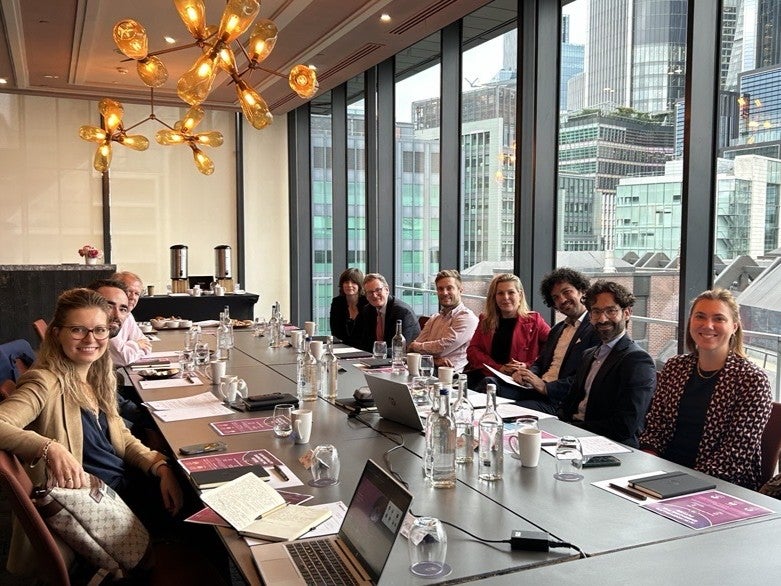Roundtable discussion: Embracing the future of AI in hospitality
In September 2025, Christie & Co hosted a roundtable discussion on the advancement of AI in the hospitality sector, its benefits, potential obstacles, and the outlook ahead. Here are the key takeaways.
Business. Built around You.
Your expert business property advisers


For a roundtable breakfast held in September 2025, our hosts Pierre Ricord (Head of Hotel Consultancy), Luc Espaillard (Associate Director – Hotel Consultancy France), Simon Chaplin (Senior Director – Pubs & Restaurants) and Jeremy Jones (Head of Hotel Brokerage UK) were joined by Ali Powell (CEO and Founder - Commercial Acceleration), Heleri Rande (Partner - Think Hospitality), Sofia Strahl (CEO - hostz Hospitality) and Carmen Hui (Director, Commercial Strategy - Booking.com), as well as operators, investors, lenders and sector experts.
Here are some key highlights from the discussion on the vast and ever-relevant topic of AI.
THE STATE OF PLAY
Global AI adoption has boomed in recent years, with just over 7 out of every 10 companies worldwide now using AI in at least one area of operations (source: Mezzi). The global AI market was valued at $184 bn in 2024, projected to grow to $826.7 bn by 2030, and businesses expect a 38% boost in profitability this year due to the use of AI.
However, in the hospitality sector, uptake is markedly slower. Around 11% of accommodation businesses used AI as of late 2023, and the sector’s adoption of AI falls behind that of finance, healthcare, retail, manufacturing, education and professional services.
Nevertheless, AI�’s role in hospitality is fast growing, and while integration is uneven, AI is increasingly embedded in guest services, operations, marketing and back-office functions. Between 2018 and 2024, approximately 65% of tech investments in the travel and mobility sectors were made in AI and machine learning (source: Statista).
Consumer use of AI tools has accelerated rapidly, whether consciously or not, and we are seeing more people turning to platforms like ChatGPT to research and plan their trips than ever before. Companies including Google and Oracle have recently announced billion-dollar AI investments, and the technology is embedded within Google Search and Gmail often without users realising. As such, companies are shifting to focus on ‘AIO’ (AI optimisation) as much as SEO in their marketing strategies, to continue attracting traffic.
THE INTEGRATION OF AI IN HOSPITALITY BUSINESSES: USES & EXAMPLES
At the roundtable, attendees discussed the variety of ways in which AI is being incorporated into hospitality business functions, including:
- AI chatbots and integrated apps - providing booking, management, itinerary and concierge services, with targeted local recommendations and 24/7 availability
- Real-time multilingual support - enabling hoteliers to accommodate global travellers with hyper-personalisation
- Touchless check-in and check-out systems using facial recognition - improving the speed of service and enhancing guest privacy
- Delivery robots for F&B and room service specifically - freeing up staff to focus on guest engagement
- Integration of AI into PMS, CRMs, and booking engines - facilitating personalised experiences, predictive services, and automated marketing based on customer data, at scale
- Predictive maintenance and AI-informed rotas - to streamline housekeeping, staffing and operational efficiency: crucial in a sector where labour makes up around 70% of cost
- Demand forecasting, using AI algorithms to optimise inventories and introduce dynamic pricing - helping to reduce food waste and optimise revenue through market intelligence
- Back-office automation, such as accounting, staffing and procurement -to centralise communication and improve workflows
The room agreed that, in the hospitality sector, the basics of service remain crucial. While AI creates exciting new opportunities to deliver slick experiences, getting the essential transactional tasks such as invoicing right must remain a priority.
Looking at F&B, AI data-led decision making is increasingly enabling operators to reevaluate traditional service models and align their offerings with evolving guest expectations. We are seeing some restaurants restructuring their opening hours to optimise labour and reduce costs, closing during low-traffic periods like mid-afternoon, while other brands are entering the breakfast market to capture early-day demand, especially near hotels.
AI is also playing a role in early-stage investment planning and due diligence, e.g. concept renderings, estimating build costs, and supporting underwriting discussions with investors. While it helps teams visualise potential outcomes and model scenarios, there is still caution as to the reliability of information, and so the later and more binding decisions still rely on human judgment and thorough local market research and knowledge.
Virtual and augmented reality were raised as important focus areas, complementary to AI. With the growing importance of ancillary revenue, such as events, weddings and conferences, VR experiences allow potential consumers to walk through the venue from anywhere in the world. Operators are capitalising on this virtual tour technology to showcase their spaces to a global audience and increase sales.
Both AI and VR are also being employed in staff training, to create rehearsal scenarios and help standardise training company-wide, in turn boosting customer satisfaction and staff performance. This is likely to become of even greater relevance as a means of training, as hyper-personalisation of service becomes an expectation by customers, in the context of a multi-lingual and tech savvy labour force.
WHAT DOES ‘SUCCESS’ LOOK LIKE, WHEN IT COMES TO ADOPTING AI?
We are seeing a growing expectation among guests for personalised experiences, with intense competition in the market driving innovation. The room discussed some success criteria for implementing AI solutions effectively, which included:
- Robust data infrastructure and system interoperability
- Staff training and change management
- Corporate governance and ethical data use
- AI capabilities must align with wider business goals
Concerns remain around data privacy and confidentiality, especially when using third-party tools. It was shared that some teams are working with custom-trained models, to ensure data security and compliance.
The core value of AI lies in its ability to process data at unprecedented speed. Attendees agreed that repetitive tasks during the pre-arrival, upselling, and follow-up stages are key areas of focus, with the human touch still important for delivering welcome moments and true ‘hospitality’.
OBSTACLES TO INTEGRATION
Another topic of discussion was that, as hospitality businesses are typically low margin, high pressure environments, one of the biggest barriers to AI adoption is the upfront cost of investment.
Small organisations are particularly hesitant to take the risk of implementing new systems, whereas larger operators can afford to experiment, and have the bandwidth to do so. The market is fragmented, and this has created an overwhelming range of options and providers to consider. The sheer speed of innovation can be intimidating, and it is difficult to quantify the ROI of AI systems to justify the initial cost, time and resource required.
Legacy systems are another obstacle. Operators with long-established systems in place may feel it is simply too big a task to introduce a new AI system and ensure interdependency with other tools and suppliers. Around the table, it was agreed that new systems need to be seamlessly integrated with existing POS and CRM platforms, to harness the full potential of data-driven insights.
Staff training is another challenge to overcome, ensuring teams have the necessary skills to embrace and work alongside AI technologies effectively.
And, despite the sharp rise in consumers using AI for travel planning, when it comes to service, it was discussed that guests are still seeking human interaction and a memorable experience, particularly in environments like boutique hotels and restaurants. It was noted that guests are typically far less forgiving with AI mistakes than those made by a human. Knowing when to employ AI, and when not to, is crucial.
LOOKING AHEAD…
A common question on the topic of AI is: will it replace people’s jobs?
This was debated around the table, with attendees agreeing that AI is an opportunity to improve efficiency and redeploy staff to where they can add most value, rather than replace them. It was concluded that human input is still best when it comes to creativity and unique ideas.
Players in the sector are taking different approaches, with some building their own tools while others are partnering or integrating multiple. One attendee recommended that operators considering introducing new AI technology should start by looking at the specific problems they want to address, and then explore how AI solutions can solve them.
By nature, hospitality requires an element of authentic human interaction, and while AI is a useful tool to enhance productivity and boost performance, it is not the answer to all problems. Ultimately, attendees agreed it is about choice: what to automate, and what to keep human.
It was also agreed that discussion forums, like this one, can help ‘demystify’ the role of AI in hospitality. Over the past decade, other real estate classes have seemed to ‘blur the lines’ and integrate elements of hospitality to remain competitive, so it is in our hands to match this and make the hospitality sector a leading force of innovation.
To find out more about our hotel consultancy services, from viability and feasibility studies to commercial due diligence, strategic advice, and bespoke market research, contact Pierre Ricord: pierre.ricord@christie.com or +44 7546 698 685.
